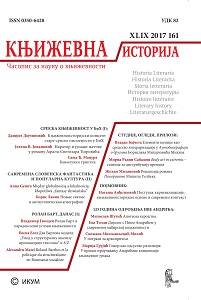Апотeоза херојства (Иво Андрић и Млада Босна)
The Apotheosis of Heroism: Ivo Andrić and Young Bosnia
Author(s): Miloslav ŠutićSubject(s): Serbian Literature
Published by: Институт за књижевност и уметност
Keywords: heroism;bravery;“beauty of sacrifice”;assassination;ethics;aesthetics;violence;freedom;annexation;tyranny;humaneness;Young Bosnia;I. Andrić;F. M. Dostoevsky;L. N. Tolstoy;Aristotle;
Summary/Abstract: The topic of this paper is Andrić’s attitude towards heroism as one of the general notions in his literary work. He discusses these notions in the manner in which, according to him, all writers do: by finding concrete examples of their presence in life, that is, by using the language of sensuality, like all artists, and not the language of pure nationality employed by philosophers. Instances of heroism, as Andrić realized in his grammar-school age, are the assassinations carried out by the members of Young Bosnia targeting the rulers of the Austro-Hungarian Monarchy, which occupied Bosnia and Herzegovina in 1908. The moral justification for this act is contained in fighting for freedom as the chief ethical goal by any means necessary. For Andrić, as for all the members of Young Bosnia, heroism is the notion implying bravery and readiness to sacrifice oneself, which is, as regarded by Dostoyevsky, too, both an ethical and aesthetic category. Andrić’s ethical role-models, not just in this case, are: Aristotle’s “moral activism” and, particularly, Njegoš’s “heroic ethics”. Andrić wrote about his grammar-school friends and other members of Young Bosnia, the assassins, with great respect, in various genres of his early and late literary works.
Journal: Књижевна историја
- Issue Year: 49/2017
- Issue No: 161
- Page Range: 105-132
- Page Count: 28
- Language: Serbian

